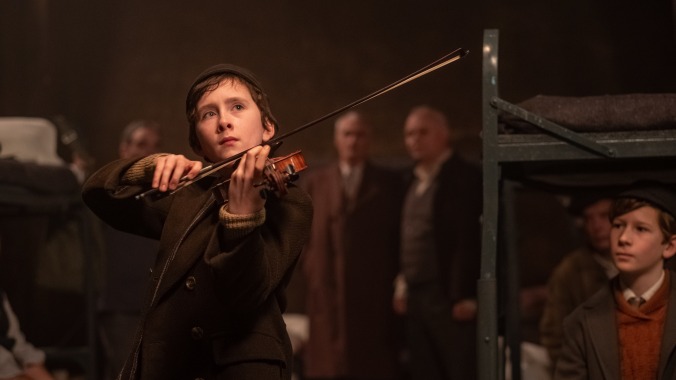The Song Of Names is a chore of a mystery, even though its resolution is very moving

In a good detective story, the investigation tends to be more important than the solution. Who can even remember, for example, what Bogart’s gumshoe gets hired to do, or even what he ultimately discovers, in The Big Sleep? Indelible performances and pungent dialogue make that film great, whereas the answers to its narrative questions are largely an afterthought (with one question notoriously never answered at all). That’s decidedly not the case with The Song Of Names, in which Tim Roth plays an amateur sleuth trying to find out what became of a childhood friend who mysteriously vanished. What he discovers is powerfully moving, but every step of his journey—and of the copious flashbacks that fill in various blanks—tests the viewer’s patience. It’s like eating an entire box of stale cereal to get to the prize.
Adapted from a novel by the English classical-music critic Norman Lebrecht, The Song Of Names opens in 1951, at what’s supposed to be the London debut of a young Polish-born violinist, David Eli Rapoport. The kid never shows up, however, to the dismay of the concert’s promoter and his teenage son, Martin (Gerran Howell). The film then jumps forward 35 years, as the middle-aged Martin (now played by Roth), who either works or moonlights as a judge of musical competitions, takes notice of a boy with an unusual bow-rosining ritual. It soon becomes clear that he recognizes this gesture, and the film spends its first hour alternating between 1986, as Martin follows this clue and others in search of a ghost that still haunts him, and the years during and immediately following World War II, during which Martin’s family takes Jewish refugee Rapoport (whose first name is actually Dovidl) into their home. Initially antagonistic, the two boys, who are roughly the same age, eventually become very close, fueling the older Martin’s obsessive desire to learn why he disappeared and what became of him thereafter.
It’s not spoiling anything to reveal that Martin does find Dovidl, since Clive Owen, who plays the character in adulthood, gets above-the-title billing alongside Roth (despite not showing up until the film’s second hour). Their reunion triggers a devastating flashback to what happened on the night of the concert, which involves both the film’s title and the fate of Dovidl’s family, of whom he had heard nothing after they were shipped to Treblinka. This lengthy, beautiful scene is the story’s raison d’être, and director François Girard (who previously helmed such music-themed films as The Red Violin and Thirty Two Short Films About Glenn Gould) does it full justice; no eyes will be left dry.
Sadly, though, everything else flatlines. The boys’ friendship feels thoroughly generic, perhaps in part because they’re played by multiple actors at different ages. Consequently, adult Martin’s quest to find Dovidl carries little emotional weight, with Roth often looking more weary than determined—this guy might as well have been hired by a client, frankly. And while the revelatory flashback partially compensates for the lackluster setup, it’s not even the movie’s climax, which ends up hinging, quite ludicrously, on that concert abandoned 35 years earlier. Is a mediocre film worth seeing for a single magnificent sequence that only works properly in context? Here’s the test case.